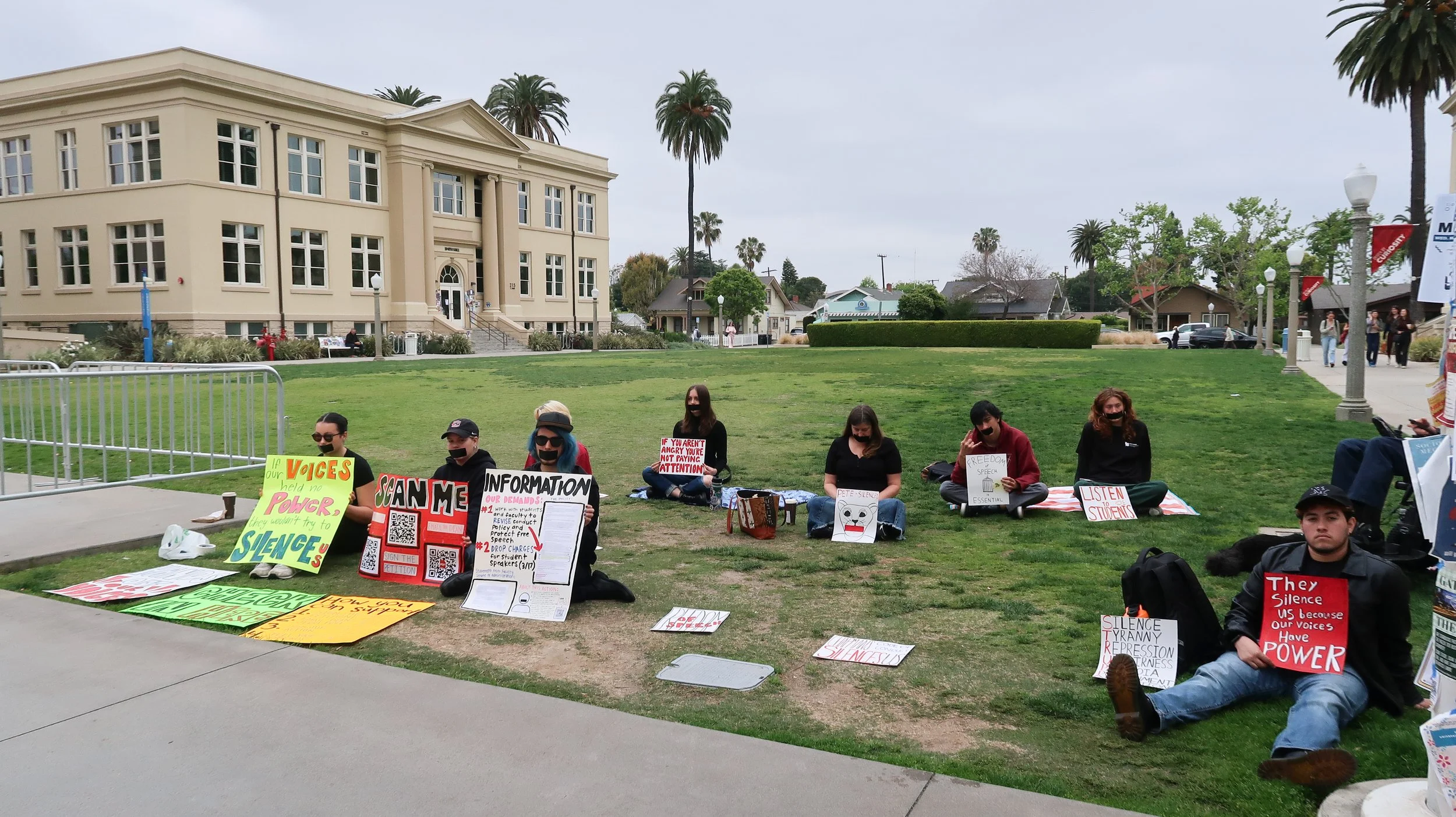Silent protest: ‘Chapman is silencing students’
Photo by Emily Paris, Photo Editor
Students and faculty gathered on Memorial Lawn with tape covering their mouths to symbolize that Chapman’s policies are restricting free speech on campus.
On April 30, a week after the last protest, students and faculty once again gathered at Memorial Lawn to show their discontent with decisions made by the Chapman administration. This time their demand was simple: protecting free speech at Chapman.
“In the aftermath of the protest (to protect diversity, equity and inclusion), several of the speakers were charged by the university for violating the student code of conduct,” said a freshman peace studies major who asked to remain anonymous. “So what we're protesting (against) is that code of conduct that those students were charged under.”
The protest saw students and faculty alike gather and sit in silence, many with tape over their mouths as a symbol of “the forced silencing of students,” according to the poster containing information on the protesters that bystanders could look at for information.
“I think it's a really powerful message to have the silent protest with the demands that they have,” said Jadis Kirk, a junior communication studies major. “I've been to the past few protests, one with the megaphone, one with without and, regardless of having the megaphone or not, (the university) limiting the people to be able to use that is an infringement on our rights. A university should be a place where you can speak freely and say the things that you need to say.”
The demands were to revise the current conduct policy to protect free speech, as well as to drop the charges against the student speakers who used amplified sound during the protecting DEI protest that took place on March 17.
“I certainly support the students rights process, and I'm very glad they're interested in the topic of free expression. It's very important to us. I think the premise of the protest is not accurate. We allow enormous freedom of speech on campus,” Dean of Students Jerry Price told The Panther. “Over the last year, we have been criticized a lot for allowing many signs, posters, chants that people found offensive and hateful, but we allowed it under that policy. So, I respect the right, I appreciate their motivation. I just think the premise under which they're doing this is not well-founded.”
The current policy prohibits “any use of amplified sound, bullhorns or other sound” that may disrupt university activities unless it has prior approval.
“It's specifically the amplification of sound (we’re wanting to change),” said the freshman peace studies major. “It was newly instated this year and has been biasedly implemented against free speech and protesters on campus, so our protest is asking for a revision of that policy in collaboration with students and faculty, and also for those charges against the students to be dropped.”
This is a new policy that was implemented in September due to the fact that the encampments in support of Gaza happening on campus at the time were reported to be disrupting classes.
“We changed two policies, one that says you have to get approval in advance to use amplified sound, and you can't set up an encampment. Those are the only two changes that we have made and the rule about using amplified sound on memorial lawn has been in place for years, it wasn't changed last summer. The rest of the policy was changed to reflect more (the policy in place for) Memorial,” said Price.
The protest saw around 20 participants throughout the day, with many of them being faculty members sitting in solidarity with students. The protesters were also wearing denim and red lips in solidarity with survivors of sexual assault on Denim Day, as well as wearing black to reflect the “death of free speech on campus,” according to the information poster.
“I think it's really cool that they have it so anyone can walk up and take a piece of tape and sit down,” said Kirk. “It was funny cause I would ask (the protesters) questions and they couldn't talk, which I think also speaks to the strength that you have with your voice, because without it you truly have almost nothing.”
The protesters also had a QR code, which students passing by the protest were able to scan to send an email to Price to show support for a change in policy, as well as one linked to a petition to send to President Daniele Struppa.
Photo by Emily Paris, Photo Editor


